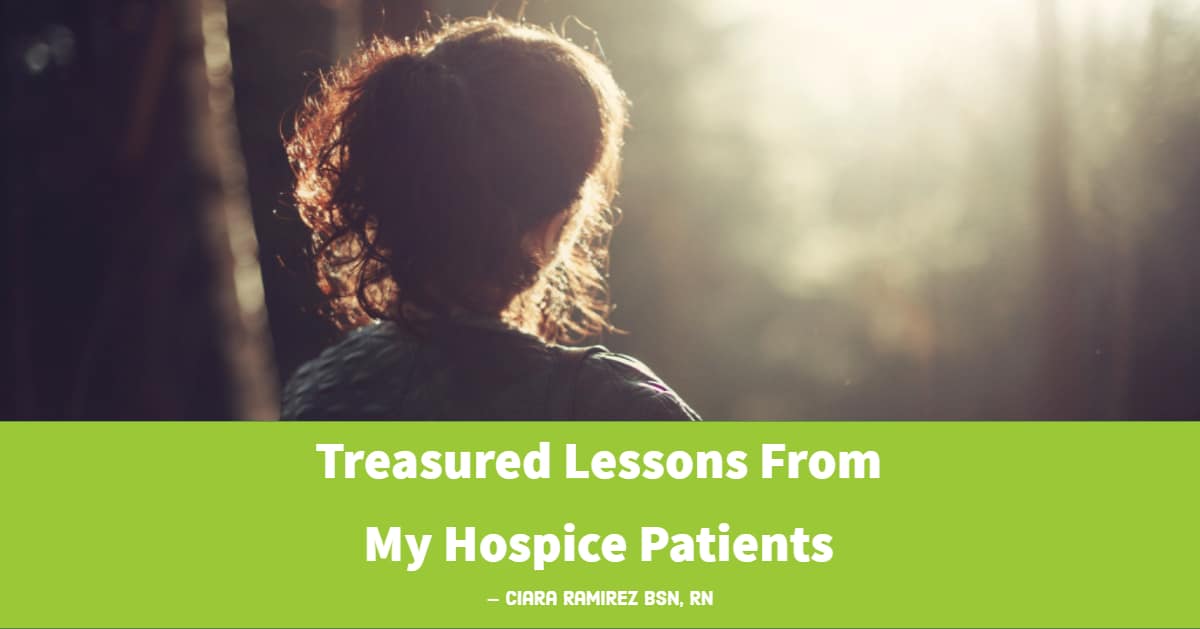Treasured Lessons From My Hospice Patients
One of the key themes of nursing school is the development of time management. We are taught to move quickly and efficiently, whilst remaining accurate and mindful. While working through problem ‘A’, you are contemplating multiple alternative results, as well as gearing up for problems ‘B’ and ‘C’. You can plan, but at any given moment, a hospice patient’s needs change and the nurse must adapt quickly, seamlessly, and completely inconspicuously to their patient. The mind of a nurse is never a quiet one. That said, even the most compassionate nurses experience robotic, autopilot days as mounting tasks leave little room for much else besides, “Go, go, go!”
My hospice patients, however, quickly showed me that most of these things are menial and of total insignificance to the terminally ill person. A dying person is hardly concerned with medication administration times, traffic, ringing cell phones and charting deadlines. They know a secret that the rest of us have not yet discovered: Time is short, life is a flash, and many tasks are mere distractions from what nourishes the soul and truly matters in this life.
In retrospect, I always have to chuckle that the most significant, touching moments I’ve shared with patients and their loved ones happen at the most unexpected times. I have absolutely no forewarning or hint that a routine visit I am about to walk into could completely change me and the way I view nursing, hospice, and life!
“There will be a rumble in Heaven if another woman is living in my castle!”
As our conversation progressed, Joyce shared with me that her husband had passed away years before and that her greatest desire was to pass on to be with him. Just when the conversation got to the point where any polite listener would offer condolences and a gentle embrace, Joyce quickly interrupted me, “Oh, he better not be up there with his first wife! There will be a rumble in Heaven if another woman is living in my castle!” I was caught totally off-guard. I felt my eyes grow wide and all of my facial muscles stretch across the length of my face. I let out a roar of laughter. I laughed to the point that my stomach began to hurt and tears were streaming down my cheeks. I hadn’t laughed like that in a really long time. That day, Joyce taught me that there is always time, even on the busiest of days, to stop and have a good laugh! It would take only a few more visits for me to learn that the more I laughed, the more I encouraged Joyce’s humor.
“We almost made it to our 40th year, baby.”
Another observation that never fails to amuse me is how it seems that whatever lessons I am wading through in my personal life always seem to become a theme in my career as well. One day as we drove to school, my daughter informed me that she didn’t want to go to school that day. As tears started to roll down her face, she explained that she had been having some difficulties on the playground. “No one would play with me yesterday. No one wants to be my friend,” she said. As I began to go through the whole process of what a parent says to comfort and reassure their child, internally, my heart broke for her. Surely I knew what it was like to feel excluded or unwanted at some point in life. Watching your own child experience this is another feeling entirely, however.
Later that day, I had another routine visit scheduled, this time with my patient Rose. Before I could even finish asking what was wrong, Rose (uncharacteristically) shouted, “Now that caregiver is sorely mistaken if she thinks she’s taking me down to that dining room ever again!” As the conversation continued Rose explained that she spent an entire meal sitting by herself in the dining hall. When I inquired about her attempts to talk with other residents, she responded, “I tried talking to a man sitting at my table, but he just got up and walked away. I don’t want to go down there again. All of those people have their little groups. No one wants to sit with a boring, old lady.” I felt like I was having deja vu. I was having the exact same kind of conversation with Rose that I had had with my daughter just earlier that morning. Then it hit me. The desire for acceptance transcends all factors of human diversity. Whether you’re six or eighty-seven, whether you are just starting your life or rounding it out, and no matter what “playground” in life you may find yourself on, we all need to feel needed. Everyone wants validation and acceptance. People need other people!
Perhaps the most treasured lesson that I have learned from my hospice patients came when I was a brand new, baby nurse. Derrick was one of the very first cardiac patients I ever cared for. His daughter had come from out-of-state to be with her mother and him during some of his final days. When we first met, he was so cheerful and had a contagious smile, one that would be quickly reciprocated from even the grumpiest of people. He just had a light about him. His family absolutely adored him. He had many questions for me related to his diagnosis. Although I was still quite uncertain of my skills and new-found knowledge at the time, his relaxed, warm demeanor put me at ease. The more I taught, the more he wanted to learn. We really fed off of one another. We enjoyed our time together but over the next month or two, Derrick’s cheerful demeanor was replaced with cycles of exhaustion versus wall-climbing anxiety. Looking back, I now know that he was battling terminal restlessness. I worked daily with his wife, daughter, and the hospice doctor to find the right medication regimen to manage his anxiety. It was very hard for everyone to see him in such a rapid decline. However, after some time, we were able to get him comfortable.
One weekend I awoke to a voicemail from Derrick’s daughter, stating that he had passed away peacefully in his sleep. I wasn’t on call that weekend, and I had never performed a death visit. However, I immediately called my manager to receive permission to make the visit. I knew that no matter how nervous I may have been, I owed it to the family and to Derrick to be his nurse just one more day. The visit was a blur, but I do remember a few things clearly. One, Derrick did look very peaceful. Two, his daughter and wife were so gracious to me as I worked my way through the visit. It was difficult for me professionally and personally. At the time, I basically had no experience with death. Although the family was naturally battling with their own loss and grief, they were so kind to me. It was a very humbling experience.
“In hospice, showing emotion isn’t taboo or a sign of weakness.”
Derrick had elected to donate his body to science; a true testament to the kind of person he was. Even in death, he was concerned with the betterment of others. Just before the men were about to take his body away, Derrick’s wife reached her hand out and place it on top of his, saying, “We almost made it to our 40th year, baby.” I thought to myself, “Wow. They have spent more years as man and wife, than I have even spent alive. How incredibly painful this must be for her.” In that moment, I lost it. Rather than being the strong structure for these wonderful ladies, I sobbed like a baby. Immediately, they came over to me, the three of us embraced and we cried together. As I looked up at their faces, almost prepared to see the increased pain I was causing, I was shocked to see that wasn’t the case. It was as though our mixed sadness was bringing comfort to one another. That day I learned that in hospice, sometimes it’s okay to cry.
Perhaps the most common question I get asked from fellow, non-hospice nurses goes something like, “How could you do that job? Isn’t it so sad? I would be afraid I would cry!” It is during these conversations that I always wholeheartedly explain that it is okay to cry in hospice. Hospice is one arena in life where it is totally acceptable to be in touch with human emotion. Hospice patients and their families are coming in such close contact with the true meaning and significance of life. Emotion, expressed by a nurse, chaplain, social worker, aide, volunteer, friend, or loved one, doesn’t bother the terminally ill. As shocking as it may seem, hospice is a very warm practice. In hospice, showing emotion isn’t taboo or a sign of weakness. In my experience, it actually comforts patients and their families. It unconsciously gives them permission to let the floodgates of raw emotion open, for this is where true healing can begin. Hospice is not a place where life is forgotten, but where life is all the more examined and appreciated. It has been through my hospice patients that I have experienced the most personal growth and healing. It has been through hospice, and my patients there, that I have learned some of my most treasured life lessons.
Sold Out hospice stories on our hospice blog
Please feel free to contact us with any questions regarding hospice care


